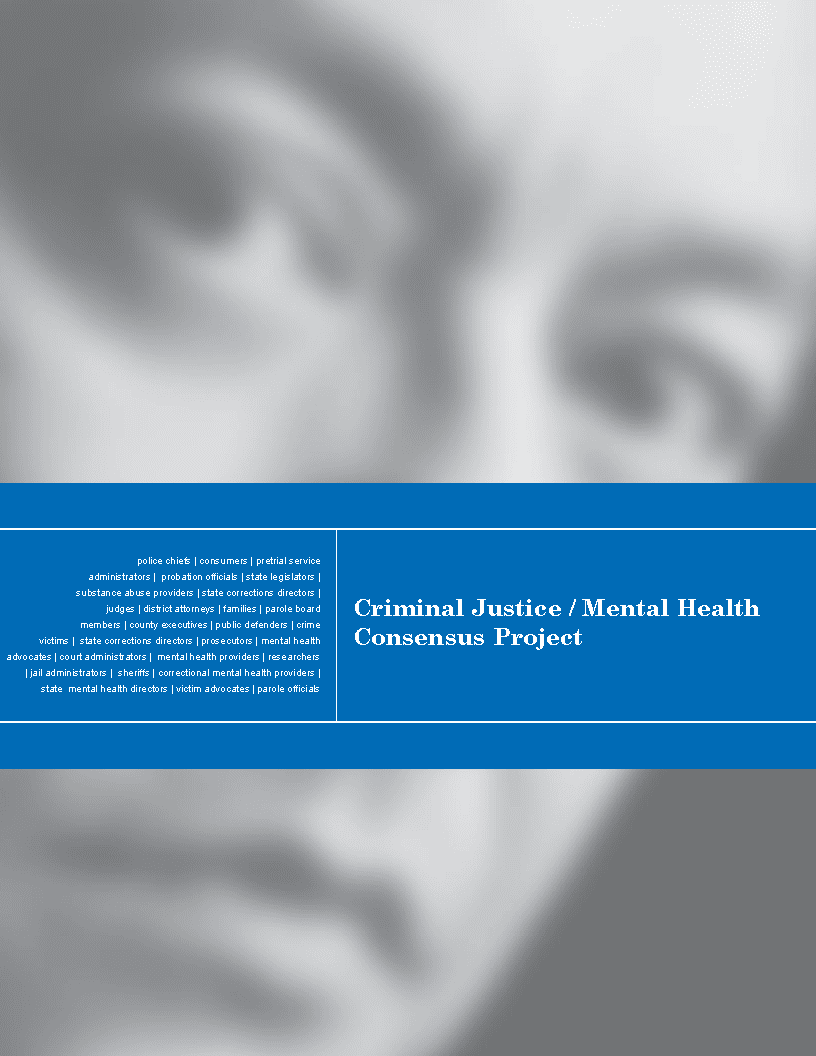The Consensus Project Report
Criminal Justice / Mental Health Consensus Project
The Criminal Justice / Mental Health Consensus Project is a unique effort to define the measures that state legislators, law enforcement officials, prosecutors, defense attorneys, judges, corrections administrators, community corrections officials, and victim advocates, mental health advocates, consumers, state mental health directors, and community-based providers agree will improve the response to people with mental illness who are in contact (or at high risk of involvement) with the criminal justice system.
The target audience of the Consensus Project Report is those individuals who can be characterized as agents of change: state policymakers who can have a broad systemic impact on the problem and an array of practitioners and advocates who can shape a community’s response to the problem. Legislators, policymakers, practitioners, and advocates can champion the detailed recommendations in the report knowing that each has been developed and approved by experts from an extraordinarily diverse range of perspectives who work in and administer the department, agencies, and organizations trying every day to address the needs of people with mental illness involved (or at risk of involvement with) the criminal justice system.
The Consensus Project Report addresses the entire criminal justice continuum, and it recognizes that actions taken by law enforcement, the courts, or corrections have ramifications for the entire criminal justice system. The report also recognizes that people with mental illness who are involved with the criminal justice system live in or return to communities, each of which has distinct issues, challenges, assets, and potential solutions to enable people with mental illness to avoid or minimize involvement with the criminal justice system.
The report provides 47 policy statements that can serve as a guide or prompt an initiative to improve the criminal justice system’s response to people with mental illness. Following each policy statement is a series of more specific recommendations that highlight the practical steps that should be taken to implement the policy. Woven into the discussion of each recommendation are examples of programs, policies, or elements of state statutes that illustrate one or more jurisdiction’s attempt to implement a particular policy statement. While promising, many of these initiatives are so new that they have yet to be evaluated to certify their impact on individuals and systems. Still, they demonstrate how partnerships and resourcefulness can be successfully replicated or tailored to the unique needs of a variety of communities. These examples should also help communities to build on the achievements without duplicating the failures or inefficiencies of others.
State and local government officials and community leaders can use these policy statements, recommendations, and examples to get beyond discussing the issue and to begin developing initiatives that will address the problem.
 New Hampshire Continues Justice Reinvestment Effort to Improve Conditions for People Who Are High Utilizers of Criminal Justice and Behavioral Health Systems
Read More
New Hampshire Continues Justice Reinvestment Effort to Improve Conditions for People Who Are High Utilizers of Criminal Justice and Behavioral Health Systems
Read More
 New Hampshire Commission Reviews Final Policy Recommendations to Reduce Reliance on Incarceration as Part of Justice Reinvestment Initiative
Read More
New Hampshire Commission Reviews Final Policy Recommendations to Reduce Reliance on Incarceration as Part of Justice Reinvestment Initiative
Read More
 Three Things to Know About New Jersey’s Groundbreaking Community Response Legislation
Three Things to Know About New Jersey’s Groundbreaking Community Response Legislation
In response to growing calls for police reform in New Jersey, particularly following the shootings of Najee Seabrooks and Andrew Washington in March and August 2023, a coalition of law enforcement officials, mental health professionals, and community advocates partnered to explore public safety response alternatives.
Read More













